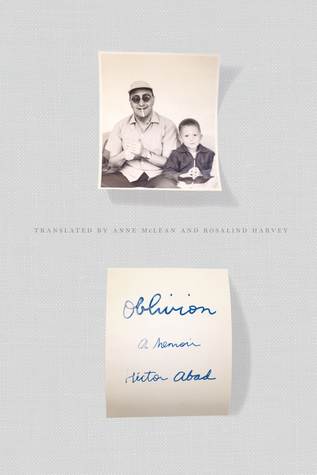
Oblivion
A Memoir
کتاب های مرتبط
- اطلاعات
- نقد و بررسی
- دیدگاه کاربران
نقد و بررسی

May 14, 2012
Colombian author Abad (The Joy of Being Awake) dedicates this loving and sentimental memoir to his father, Héctor Abad Gómez, a professor and doctor devoted to his family, "moved to tearsâ¦by poetry and music," and committed to a better Colombia. The latter aspiration cost him his life when he was assassinated in 1987, and his son began writing this book five years later. Abad spends much of the book expressing his love for his father, but it is his discussion of Gómez's public health and human rights projectsâsuch as founding "the Colombian Institute of Family Wellbeing, which built aqueducts and sewer systems in villages, rural districts, and cities"âthat reveals what a remarkable educator, reformer, and activist the senior Abad was, and how his assassination (most likely ordered by Colombia's political leadership at the time) was a tragedy for a family and a nation. Those unfamiliar with Abad's and Gómez's writings will nevertheless find this timely memoir moving and informative.

Starred review from March 1, 2012
A Colombian writer delivers a rousing, affecting tribute to his father, Hector Abad Gomez, a professor and physician who was murdered in 1987 by radical political opponents. Gomez--who, according to the author, had limited skill with his hands and once inadvertently hastened the death of a surgical patient--moved from private practice to become a passionate advocate for public health, in Colombia and elsewhere, and a fiery writer of books, essays and op-ed pieces opposing violence and promoting personal freedom and equality--ideas sure to get you killed in many places. The son adored the father and writes about what in many was an ideal, if not idyllic, childhood. Gomez was extraordinarily affectionate and latitudinarian in just about everything. He continually encouraged his son, profoundly patient with him and loved him with a patent preference that in some ways, as the author recognizes, was unfair to the author's sisters. Abad remembers the conflicts in his family, notably the deeply pious Roman Catholic women who struggled mightily against the father's more liberal religious views. He also remembers with lingering horror the death of his own talented sister to cancer. The author creates enormous dramatic irony in his text: We know from the beginning that his father will be murdered, so Abad imbues every moment with an aching pathos. The translators have preserved his facile and sophisticated uses of the language. One 205-word sentence, for example, unspools with absolute clarity. Sometimes the detail is grim and wrenching--a sewer pipe clogged with tapeworms, his poor dying sister's physical decline, his father's bullet-riddled corpse. One small reservation: a tendency--somewhat understandable--to quote excessively from his father's publications. Is there a father alive who would not weep at such an artful, tender tribute?
COPYRIGHT(2012) Kirkus Reviews, ALL RIGHTS RESERVED.

May 1, 2012
In this memoir, Colombian novelist Abad (Angosta, 2004) remembers his father, medical doctor and public-health advocate Hector Abad Gomez, who was gunned down by right-wing paramilitary forces in 1987. The elder Abad was gregarious, compassionate, a defender of the poor, and a doctor against pain and fanaticism with a passion for classical music and his rose garden. He was also an unfailingly permissive parent, and his only son loved him fiercely and unabashedly, with an animal love of his scent and his presence. Abad recalls a childhood defined by the competing influences of his father's humanistic beliefs and the strict Catholicism of his mother and his parochial schoolteachers; subtler but still present are the contrasts between his bucolic Colombian surroundings and the politically motivated violence that would eventually claim his father. After much circling around the subject, Abad summons the courage to describe the circumstances of his father's murdersix bullets in the head, in broad daylight, on a Medellin streetand even now, more than 20 years later, neither Abad nor Colombia have quite healed. This moving memoir is thus also an important work of historical witness.(Reprinted with permission of Booklist, copyright 2012, American Library Association.)

























دیدگاه کاربران